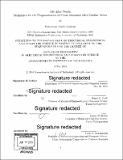| dc.contributor.advisor | Roger G. Mark and Emery N. Brown. | en_US |
| dc.contributor.author | Ghassemi, Mohammad Mahdi | en_US |
| dc.contributor.other | Massachusetts Institute of Technology. Department of Electrical Engineering and Computer Science. | en_US |
| dc.date.accessioned | 2018-09-17T15:57:10Z | |
| dc.date.available | 2018-09-17T15:57:10Z | |
| dc.date.copyright | 2018 | en_US |
| dc.date.issued | 2018 | en_US |
| dc.identifier.uri | http://hdl.handle.net/1721.1/118092 | |
| dc.description | Thesis: Ph. D., Massachusetts Institute of Technology, Department of Electrical Engineering and Computer Science, 2018. | en_US |
| dc.description | Cataloged from PDF version of thesis. | en_US |
| dc.description | Includes bibliographical references (pages 120-134). | en_US |
| dc.description.abstract | Electroencephalography (EEG) features are known to predict neurological outcomes of patients in coma after cardiac arrest, but the association between EEG features and outcomes is time-dependent. Recent advances in machine learning allow temporally-dependent features to be learned from the EEG waveforms in a fully-automated way, allowing for faster, better-calibrated and more reliable prognostic predictions. In this thesis, we discuss three major contributions to the problem of coma prognostication after cardiac arrest: (1) the collection of the world's largest multi-center EEG database for patients in coma after cardiac arrest, (2) the development of time-dependent, interpretable, feature-based EEG models that may be used for both risk-scoring and decision support at the bedside, and (3) a careful comparison of the performance and utility of feature-based techniques to that of representation learning models that fully-automate the extraction of time-dependent features for outcome prognostication. | en_US |
| dc.description.statementofresponsibility | by Mohammad Mahdi Ghassemi. | en_US |
| dc.format.extent | 134 pages | en_US |
| dc.language.iso | eng | en_US |
| dc.publisher | Massachusetts Institute of Technology | en_US |
| dc.rights | MIT theses are protected by copyright. They may be viewed, downloaded, or printed from this source but further reproduction or distribution in any format is prohibited without written permission. | en_US |
| dc.rights.uri | http://dspace.mit.edu/handle/1721.1/7582 | en_US |
| dc.subject | Electrical Engineering and Computer Science. | en_US |
| dc.title | Life after death : techniques for the prognostication of coma outcomes after cardiac arrest | en_US |
| dc.title.alternative | Techniques for the prognostication of coma outcomes after cardiac arrest | en_US |
| dc.type | Thesis | en_US |
| dc.description.degree | Ph. D. | en_US |
| dc.contributor.department | Massachusetts Institute of Technology. Department of Electrical Engineering and Computer Science | |
| dc.identifier.oclc | 1052124083 | en_US |
